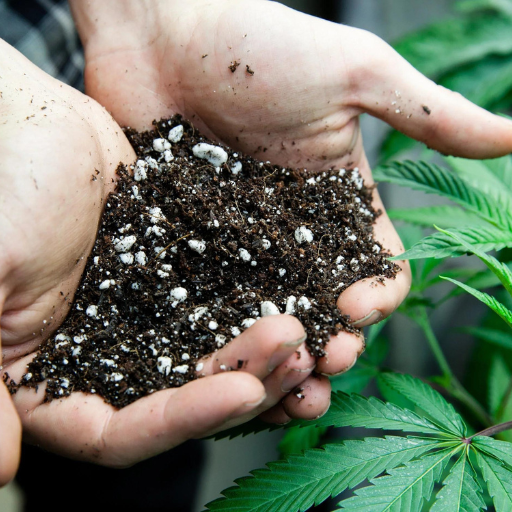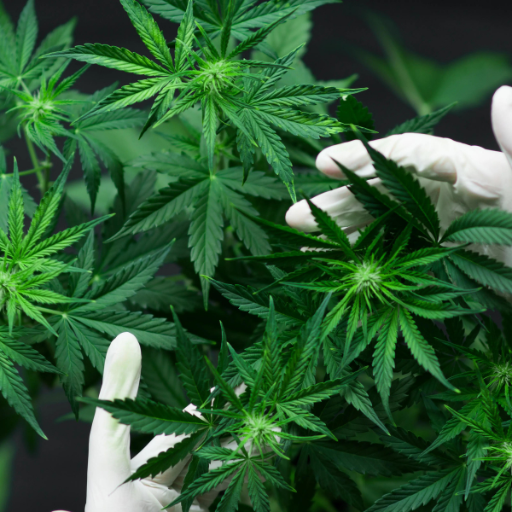Cultivating cannabis organically is not just a trend, but a conscious choice that benefits both the grower and the environment. Using organic fertilizers ensures that your cannabis plants receive nutrients in their most natural form, promoting the healthiest possible growth and the best quality yields. This guide will walk you through the essentials of selecting the finest organic fertilizers, from understanding the various types available to recognizing the specific needs of your cannabis plants at different stages of their growth. Whether you are a novice grower or an experienced cultivator looking to refine your approach, this comprehensive article will provide you with the insights and knowledge required to make informed decisions for a successful organic cannabis garden.
What is Organic Fertilizer and Why Should You Use It for Growing Marijuana?

Understanding Natural Fertilizer
Organic fertilizer is created by the use of natural resources like compost, manure, seaweed and bone meal. When compared to artificial fertilizers, organic choices only release some nutrients at a time that means you can have a steady supply of vital salts such as nitrogen, phosphorus and potassium for your cannabis plants. Soil health maintenance and nutrient burn prevention are pegged on gradual release. In addition, it stimulates microbial activity in soil which helps in decomposition of organic matter making nutrient more readily available. Organic fertilizers therefore create an environment that is supportive of strong plants growth and increased quality yields. By opting for organic method, you are involved into sustainable farming practices resulting in cleaner marijuana.
Benefits of Using Natural Fertilizers on Cannabis Plants
There are many benefits associated with the application of natural fertilizers on cannabis plants. One advantage is that they improve the land structure by adding organic matter which increases water retention capacity and nutrient holding ability of soil. Secondly, organic fertilizers facilitate balanced nutrition which minimizes over-fertilization risk as well as nutrient burn risks. Therefore through this kind of nutrient release, cannabis plants take whatever they need at any given time leading to better growth quality and yields. Also they promote microorganisms living in soils thus allowing easy break down nutrients into forms available for plant up-take This way growing cannabis using natural manure promotes environmental preservation while avoiding harmful chemicals hence cleaner marijuana.
Organic vs Synthetic Fertilizers: Which is Better for Marijuana?
The choice between organic and synthetic fertilizers for marijuana cultivation should be based on the benefits and disadvantages each approach has to offer. Organic manure obtained from naturally occurring ingredients nourishes soil texture thereby promoting long-term soil fertility as well as sustainability owing to increased microbial activity within them . It also avoids or very slowly releases nutrients so as to fuel healthy plant development over time thus preventing nutritional burns however making its usage more frequent and at times unpredictable in nutrient content.
On the other hand, synthetic fertilizers are designed to give exact nutrient ratios that allow farmers to schedule feedings based on their plants’ requirements. This can lead to more rapid growth and larger yields. Conversely, synthetic options raise nutrient burn risks but have no soil enhancing properties. Furthermore, these products can cause gradual land deterioration as well as pollution of the environment over time.
Ultimately, the choice between organic and synthetic fertilizers depends on the grower’s priorities. On one side are organic choices which support sustainable agriculture practices and help to keep soils alive. The other alternatives guarantee better control hence possibly faster results. Such an approach that balances both types could be advantageous at times since it may combine the best features of those two methods.
How to Make Organic Fertilizer for Your Cannabis Plants
Recipes for Homemade Natural Fertilizers
Recipe 1: Compost Tea
You can make a nutrient-rich compost tea by filling a large container with water, and let sit for about 24 hours to dechlorinate. Add one part of well-matured compost to five parts water, and steep the mixture for 24-48 hours while stirring occasionally. Filter the liquid and use it to irrigate your cannabis plants to enhance microbial activity and nutrients necessary for their growth.
Recipe 2: Fish Emulsion
Fish emulsion is a great source of nitrogen. To get this, blend fish remnants or whole fish with water in the ratio of 1:2. Let it ferment for two weeks stirring from time to time. When fermentation is complete, strain the liquid and dilute it in water at the ratio of one part emulsion to five parts of water before using on the plants. It encourages healthy vegetation with robust leaves.
Recipe 3: Banana Peel Fertilizer
Banana peels are high in potassium which is needed during budding and flowering stages. Chop up three or four banana skins into small bits and boil them in one liter of water for ten or fifteen minutes. After cooling, strain it out then dilute it with equal amount of water; you can start watering your garden with this fertilizer especially when your flowers are blossoming so as to ensure that they grow healthy and better yield.
Essential Nutrients Required For Cannabis Plants To Grow
Essential nutrients required by cannabis plants can be categorized into macronutrients which include secondary macronutrients like micronutrients together with other elements essential for plant growth. The primary macronutrients are nitrogen (N), phosphorus (P) and potassium (K) known as N-P-K respectively.Nitrogen helps in vegetative growth while phosphorus aids root development including flowering process thus helping plants develop seeds while potassium improves overall healthiness of plants and resistance to diseases.
Secondary macronutrients such as calcium (Ca), magnesium (Mg) and sulfur (S) are equally important besides the primary macronutrients. Calcium is crucial for cell wall development; Magnesium plays an essential role in the production of chlorophyll while Sulfur is very necessary for amino acid synthesis.
Although needed in small quantities, micronutrients are also important. Some of them include iron (Fe), manganese (Mn), zinc (Zn), copper (Cu), boron (B) molybdenum(Mo)and chlorine(Cl). Every micronutrient has a specific role to play during plant metabolism or growth. Iron is necessary for formation of chlorophyll, manganese is required in respiration and nitrogen assimilation, zinc activates enzymes, copper assists photosynthesis process , boron provides strength to cell walls, molybdenum fixes nitrogen while chlorine helps osmosis and ionic balance within the plant.
Balanced supply of these nutrients ensures that cannabis plants grow healthily and yield highly. Consistent monitoring as well as proper fertilization helps to address these nutrient requirements effectively.
Using Compost and Manure in Organic Fertilizers
Compost and excreta are very important ingredients of organic manures. They provide minerals that are necessary for the growth of plants, as well improve the structure of the soil. Designed from decomposed organic compounds, compost gives a slow-release feedstock while enhancing microbial activity in soils. It enriches soils by adding macronutrients such as nitrogen, phosphorus and potassium required by plants together with needed micronutrients. In contrast, manure is high on nitrogen content and contributes organic matter to soil thus increasing its ability to retain water and providing better aeration. Both composting and excrement can contribute to strong root growth as well as improved soil fertility which makes them vital elements in organic farming for sustainable high productivity farming systems. Incorporation of these additives into soils results in healthier plants leading to an increased overall garden output.
What are the Best Types of Organic Fertilizer for Cannabis Cultivation?

Enriching Soil with Worm Castings
Worm castings, also known as vermicasts, are highly useful organic fertilizers for marijuana farming. These excrements contain a high quantity of vital elements as well as beneficial microorganisms.’ They also enhance water holding capacity and aeration by worm castings that improve soil structure. This enables good growth of roots in the soil system. Nutrients like nitrogen, phosphorous and potassium contained in worm castings stimulate rapid plant growth and increase its yield. Moreover, worm castings contain microbial activity that helps to naturally suppress diseases in plants and pests’ repellent. Therefore, incorporating them into the soil is important not only for improved health of plants but also for sustainable agriculture. Hence use it regularly assure lively cannabis crop with lowest environmental impacts.
Advantages of Bat Guano for Marijuana Plants
The benefits of bat guano have seen it become an excellent organic fertilizer for cannabis cultivation. It has large quantities of essential nutrients such as nitrogen, phosphorus and potassium which promote vigorous plant growth, strong root development and abundant flowering.’ Moreover, flowering stage needs more phosphorus concentration which increases bud formation leading to increased amounts of resin on the buds. Furthermore they enhance aeration and moisture retention thereby improving soil structure thus healthier root systems.’ In addition there are micro-organisms in bat guano that improves nutrient uptake from soils thereby enhancing pathogen suppression which leads to stronger healthy plants . Incorporating bat guano into your cannabis cultivation can lead to higher yields, better health conditions for plants ,and a robust crop.
Kelp among Other Organic Supplements for Cannabis Fertilizer
Kelp is an ideal natural supplement for cannibis fertilizers because it is rich in nutrients.’ It contains micronutrients, vitamins and plant hormones (gibberellins,) such as (cytokinines) auxins,(auxins) gibberellins cytokinins among others which help stimulating fast growth and resistance of cannabis towards pests and diseases. It also makes the soil porous thus enhances water retention capacity, which in turn promotes healthier roots.
Compost tea is another natural supplement that can be beneficial for marijuana farming. This concentrated vitamin pill is delivered through compost tea, thus enriching the soil as well as improving plant immunity. Alfalfa meal provides nitrogen content that is high and has trace minerals that contribute to growth and general plant vigour.’ Fish emulsion provides nutrients necessary for healthy vigorous growth by making sure you receive a steady source of balanced nutrients needed by plants as they grow at accelerated speed. Consequently, these natural supplements support sustainable gardening practices while ensuring a thriving healthy cannabis crop.
How to Properly Apply Organic Fertilizer to Cannabis Plants

Determining the Right Amount of Fertilizer
Determining the right amount of fertilizers for marijuana plants is all about striking a delicate balance to avoid nutrient shortages or excesses. Important factors to take into account entail growth stage of the plant, strain-specific requirements and nature of organic fertilizers used. Normally, it’s a common rule of thumb that one has to begin with low dosages escalating as per how the plants behave.
- A light nutrient solution having 200-400 ppm (parts per million) is recommended in case of seedlings.
- For cannabis plants grown during vegetative phase, they typically need more nitrogen levels such as nutrient solutions that fall between 400-800 ppm.
- During flowering stage, change to higher phosphorus and potassium mixture which should range from 1000-1600 ppm.
Always watch out for signs that your plant may not be doing well and adjust your feeding routine accordingly. Testing soil or water runoff periodically helps fine-tune nutrient levels for optimal growth and yield.
Managing Fertilizer Application During Different Growth Stages
Appropriate management of fertilizer application at different stages of growth is vital in order to achieve healthy and productive marijuana plants. A mild diluted nutrient solution should be used for seedlings during this stage to prevent burn from nutrients while encouraging roots development. As the plants enter vegetative phase, their growth rate increases and therefore additional nitrogen is needed for leaf and shoot development; thus apply balanced N-P-K ratio fertilizers with approximately equal amounts 3-1-2 can boost growth at this stage.
When cannabis enters its flowering stretch, there are entirely new mineral requirements needed by them. In reducing nitrogen intake, concentrate on higher phosphorus-potassium ratios which will promote bud formation as well as overall resin production. The recommended N-P-K ratio for this period is 1-3-2. Moreover, tracking pH level and EC (electrical conductivity) levels within the soil or substrate ensures enhanced nutrient absorption.
A well-fed and thriving cannabis crop is also supported by integrated pest management as well as a careful watering regime. Growers can therefore optimize their overall yields while maintaining the health of plants by modifying fertilizer types and concentrations at every phase of growth.
Signs of Over-fertilization and How to Avoid It
There are different harmful effects that over-fertilizing can have on cannabis plants such as nutrient burn which causes burnt leaf tips and margins, and dark green leaves. Other signs include stunted growth, wilting, and root damage resulting from excessive salt accumulation in the growing medium. Begin with diluted nutrient mixtures and increase strength gradually depending on plant response so as to avoid over-fertilization. Regularly flushing the growing medium with pH balanced water helps prevent nutrient salt build up. Another way to reduce over-fertilization risks is through adopting a balanced feeding schedule for each stage of growth coupled with slow-release fertilizers. Basically, accurate observations and adjustments are essential in maintaining optimal nutrient levels for healthy development of plants.
What Impact Does Organic Fertilizer Have on Soil Health and Plant Growth?

Improving Soil Structure with Organic Matter is Vital
Enhancing soil structure using organic matter is essential in improving soil health and encouraging healthy plant growth. Incorporating compost, manure or cover crops into my soil allows me to increase the soil’s capability of retaining water as well as its aeration and nutrient availability. Practically, it helps to bind the soil particles together so that it becomes porous and easy for roots to penetrate through it thus enabling them to get both nutrients and moisture that they need to grow. Additionally, organic matter encourages the growth of beneficial microorganisms which are important in cycling nutrients and maintaining soil fertility. It’s also possible to achieve a sustainable growing environment for healthy cannabis plants with higher yields by constantly incorporating organic amendments.
Enhancing Microbial Activity in the Soil
The improvement of microbial activity within the soil is an important step towards increasing soil health and robustness in plant development. Exemplary microorganisms include bacteria, fungi as well as protozoa which take part in decomposing organic matter thereby reusing nutrients from dead organisms back into food chains and helping plant roots absorb these substances symbiotically. If I add compost, cover crops or any other carbon-rich organic amendment into my soils then there will be an energy source available for these desirable microbes hence they can multiply more rapidly therefore increase their work rate inside the earth. Moreover, there are certain methods such as reducing tillage and avoiding synthetic chemicals that help promote thriving microbial communities. Consequently this ensures improved nutrient availability, enhanced soil structure and healthier cannabis plants because these nurtured organisms help break down complex molecular structures into simple ones usable by plants.
Long-term Benefits of Using Organic Fertilizers
Using organic fertilizers benefits my cannabis plants in numerous ways over time when compared with conventional ones where everything is dealt with criminally fast such that effects are momentary rather than permanent on you land fertility. First off, enhancing water retention and air circulation through increasing organic matter content are soil structure improvements derived from organic fertilizers. This gives a better condition for root development and nutrient absorption. Secondly, since these types of fertilizers release their nutrients slowly but surely, it means that plants continue accessing their essential foods without interruption even if they take longer to grow. It is through this process that there will be reduced leaching of nutrients thereby reducing the chances of nutrient burn. Finally, organic fertilizers maintain or support biodiversity in the soil by creating favorable environment where beneficial microorganisms thrive. That way, these microbes aid in nutrient cycling as well as disease suppression hence this promotes resilience and thus increased yields over time. By going for organic fertilizers instead I can establish a sustainable yielding territory which supports my marijuana cultivation year in year out.
Frequently Asked Questions (FAQs)

Q: Is compost tea a good enough fertilizer for growing cannabis?
A: Yes, It is true that compost tea can be employed as an organic plant food for the cultivation of cannabis. It improves microbial activity in the soil, enhances nutrient uptake and supplies many essential elements required for healthy growth of marijuana crops throughout the growing season.
Q: What are the specific types of nutrients needed by medical marijuana plants?
A: Medical marijuana plants will need to have their nutrition carefully managed so as to produce high-quality cannabis necessary for medicinal purposes. Organic fertilizers may cater to these needs by providing a sustained release of food but without risk of contamination by harmful chemical components in final product.
Q: What various kinds of organic fertilizers exist for weed?
A: Several types of organic fertilizers that include compost, manure, bone meal, blood meal, bat guano and liquid fertilizers that are organically based. Each one provides different nutrients that cannabis plants require at different stages of growth thus helping you make the right decision on your cannabis garden.
Q: How often should I feed my marijuana plants?
A: You should use these substances sparingly because their effective rate is determined by what stage your crop is in and which type you prefer. Generally speaking, vegetative and flowering stages usually come with a single feeding every 1 or 2 weeks; however it’s important to follow instructions given regarding each given product not to overfeed them.
Q: Can homemade fertilizers be used to grow cannabis?
A: Yes homemade fertilizers could work if they contain what a pot plant needs when it comes to fertilizer amounts. One way this can be done is through embracing sustainability while cutting down on costs incurred during the purchase of commercial products used in cultivating the plant hence ensuring no chemicals are added up resulting to desired yields from such yielders like Lucea.
Q: How does fertilizer influence overall experience of cannabis growers?
A:The use of suitable fertilizers can greatly affect the health, quantity and quality of your Marijuana plants. Soils that are living become more fertile through organic fertilizer which enhances nutrient absorption resulting to better produce making the whole experience of cultivating marijuana more worthwhile and sustainable.






